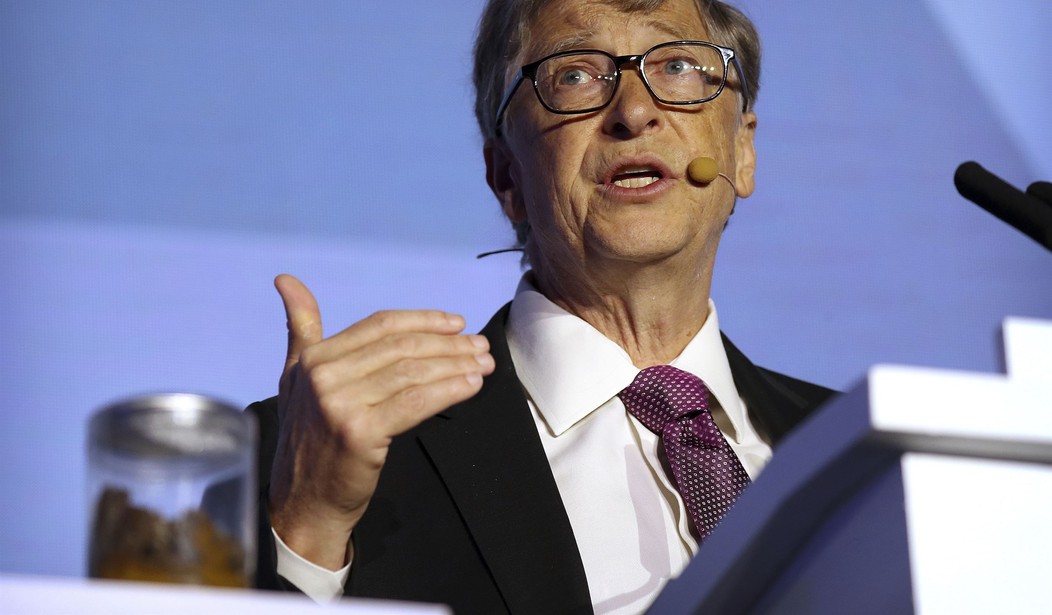Bill Gates has had some pretty lousy takes when it comes to the Wuhan coronavirus. As Katie highlighted last week, he questioned what the issue was with wearing pants, as "you have to wear pants." The comments came at the annual Munich Security Conference in Germany. As it turns out, he made worse comments, with far more dangerous implications about future pandemics. Should we ever have another virus like this, he thinks the answer is to live like Australia.
As Megan Sauer reported for CNBC last Thursday, Gates also mentioned at the conference that "If every country does what Australia did, then you wouldn’t be calling [the next outbreak] a pandemic," and also referred to the country's policies as the gold standard. Gates also claimed that "everybody had the capability to do" what Australia did, seemingly dismissing the civil liberties issues at stake.
Our friends at Twitchy pointed out the concern of some expressed over Twitter, including from those who are Australian but couldn't return home.
Close our borders for 2 years…and arrest people for violating mask mandates…yea sounds like a great idea ??????
— Mark F (@PSUbossman) February 25, 2022
I’m Australian and until very recently it was impossible to go home.
— Sean (@switterred) February 26, 2022
This is insane. Authoritarianism is seen as a solution to every problem in the eyes of these sick individuals.
— Prince Hasn (@prhasn) February 26, 2022
If we just lock ourselves indoors indefinitely and never speak to anyone and deliver all essential goods by drone, we can avoid communicable diseases! I mean, maybe. It didn't work for Australian but it sure wasn't from lack of trying
— enhazed (@enhazed) February 25, 2022
When it comes to what Gates sees as a so-called gold standard, the locked down borders is one of many examples in how Australians faced heavy restrictions as part of the country's way of dealing with the virus. Although Sauer undermines civil liberty restrictions in her own way by claiming "the measures seem to have worked," she did acknowledge the strict travel restrictions imposed.
"The country reopened its international borders this week for the first time since March 2020. Over the course of the pandemic, returning citizens and approved international travelers have been required to quarantine in hotels guarded by police and military members. Australia’s states even periodically locked down their respective borders," Sauer wrote.
Recommended
For all the lockdowns that Australia imposed, it still struggled to contain the highly contagious but also proven to be more mild Omicron variant:
Australia did struggle to contain Covid’s omicron variant. According to John Hopkins University data, 155 people died during omicron’s Australian peak on January 28. But omicron has similarly swept through the rest of the world, largely unimpeded — and it appears that Australia’s death rate is already stabilizing, with a 7-day average of 38 daily Covid-related deaths, as of Feb. 23.
There’s reason to believe Australia’s blueprint may have been less successful elsewhere: Its population of nearly 26 million is relatively small, and it’s an island without any land borders. But Gates still called it a “true outlier.”t
Further, Johns Hopkins University data, a source that Sauer cites above, also found that what lockdowns the United States had didn't work. According to a Johns Hopkins study Leah reported on, "lockdowns have had little to no effect on COVID-19 mortality." In the the U.S. and Europe, they "only reduced COVID-19 mortality by .2% on average."
At Townhall, we've covered other strict methods Australia has imposed.
There was a tracking app in place that used facial recognition software and geolocation to prove people were abiding by the strict 14-day quarantine requirements.
Complete lockdowns have also occurred over a single case, as they did in August.
Last year, The Guardian laid out a comprehensive and chilly explanation of what's allowed and what's not. At one point, it explained that residents can only leave their home for a very limited amount of reasons, and can only travel up to 15km away, or about 9 miles. If up five people want to meet for "personal training" reasons outside, they must all be vaccinated. Masks must be worn indoors and outdoors, except when it comes to people being in their own homes.
As Matt has covered, this includes how Australia has put people into quarantine detention camps. As Leah has covered, they've even taken people there who don't have the virus, but who have come into contact with those who have. The fact that Australia doesn't have a Second Amendment, or even a Bill of Rights, may have something to do with it. From 1996 to 1997, Australia confiscated 650,000 through a mandatory gun buyback program.
Tennis star Novak Djokovic was also subject to less than ideal conditions while forced to quarantine for not taking the COVID vaccine when he came to play in the Australian Open. He was ultimately deported.
Last September, I also covered Australian Prime Minister Scott Morrison's appearance on CBS' "Face the Nation," where he justified the loss of civil liberties.
Australia was one such country that went with a "zero COVID" policy, joining New Zealand which almost didn't let a pregnant journalist come home, forcing her to use her journalistic connections to seek help from the Taliban. China was another as well. As I covered during the Beijing Winter Olympic Games that went on earlier this month, also known as the Genocide Olympics, athletes who had the misfortune to test positive for the virus were quarantined in hotels with no equipment and inedible food.

























